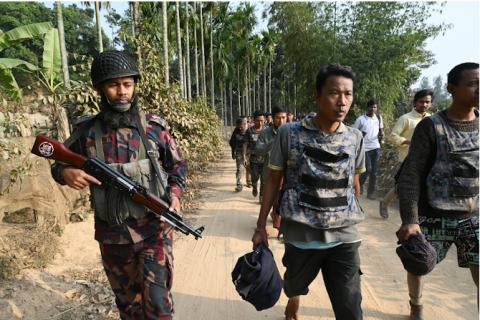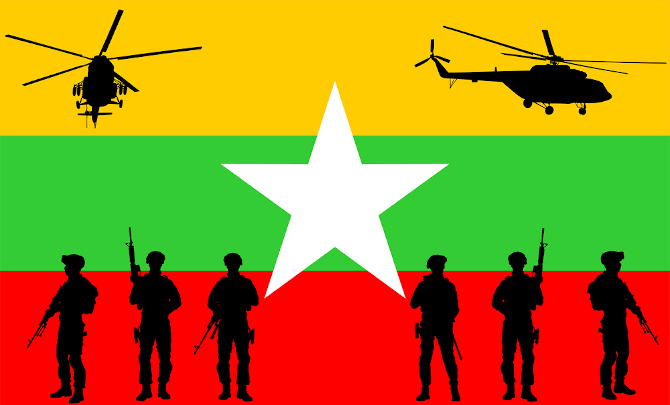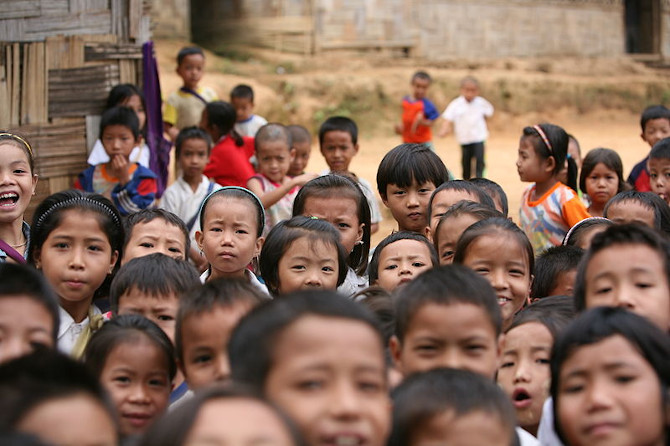As the War in Myanmar Continues, Refugees Endure Dire Conditions

--Reporting from the Thai/Myanmar border: The ongoing war in Myanmar has endured for over 70 years, with the country's 135 ethnic minority groups bearing the brunt of military repression. This has resulted in the displacement of millions, many of whom reside in makeshift camps within Myanmar as internally displaced people (IDPs).
These IDPs lack United Nations protection and receive minimal support from international aid organizations due to legal restrictions on entering Myanmar without invitation. Entire villages and towns have been abandoned, forcing civilians to seek refuge in the jungle, where they face targeted attacks from the military, including airstrikes, small arms fire, and bombings.
Some individuals opt to flee across the border into neighboring Thailand, where the sentiment "Thailand is freedom" resonates among those navigating landmines and military patrols to seek shelter in the Kingdom of Smiles. Once in Thailand, refugees face two paths: One involves attempting to reach a UN camp to secure official refugee status, while the other entails living with a quasi-legal or illegal status in Thailand, with the hope of obtaining a Thai ID card or citizenship in the future.

Official refugees in UN camps receive essential provisions such as food, medical care, and free education for their children. Additionally, they are issued a UN identity card and are permitted to legally reside in Thailand for as long as mutually agreed upon by the Thai government and the UN.
Twenty-year-old Bureh, an ethnic Karenni, shared that he was born and raised in the refugee camp, where he attended school. While he speaks English fluently, his command of Thai is limited. Despite the educational and financial advantages of being an official refugee in the camp, individuals with camp ID cards are not on a trajectory toward Thai residency or citizenship. Consequently, Bureh did not prioritize learning the language.
When asked about the refugees' possession of passports, Khu Ko Reh, representing the Karenni Civil Society Network (KCSN), responded with a poignant question: "What kind of passport?" He paused, allowing the gravity of the situation to sink in, before elaborating. "Some people maybe have Burma ID when they leave, but under the current situation, no one can get passports.” The Myanmar government has implemented compulsory conscription, wherein any male aged 18 to 35 who visits a government office to acquire a passport or ID card is immediately enlisted into the army. Afterwards, they will be sent to kill others of ethnic minority.
"I heard yesterday they arrested 18 or 20 young people trying to go back to Karenni state," said Khu Ko Reh. Like many other ethnic groups, the Karenni have established informal communication networks using platforms such as Whatsapp, Signal, and Facebook, enabling them to share news from the zone of conflict.

"They can apply for a passport and maybe leave and go to Thailand, but only if they can pay" he added. With a sizeable bribe, one could obtain a passport in Myanmar, and with an even larger bribe, they can get an exit visa. But most of the ethnic minority are extremely poor. Once a family becomes displaced, it is likely that they not only lose their ability to earn a living, but also the ability to tend their fields and grow food.
For those who hold out hope for a Thai ID card, residence, or citizenship, the first step is to not become official refugees living in the camp. The first step is easy; the rest is difficult because people fleeing Myanmar have to find a way to remain in Thailand, work, and eventually find a way to remain there legally.
Thirty-five-year-old Nang Kham, a mother of two, shares her experience as a Shan ethnic woman fleeing the war in Myanmar, and seeking refuge in Thailand. She married young, and her marriage soured after her husband was compelled to join an ethnic armed militia. "Initially, he was a good man and took responsibility for both the family and the militia. But later on, his behavior changed. He became lazy, came home late, and became easily angered." That's when Nang Kham discovered her husband's addiction to yaba (methamphetamine). The drug is produced and sold by several of Myanmar’s armed groups and transnational crime gangs, who utilize the proceeds to purchase weapons. With the despair of an endless war, yaba addiction is widespread in Myanmar and a significant problem in Thailand.

Two years after her divorce, she met another man who was also kind and took care of her and her child. However, during her second pregnancy, her new husband was forced to join an armed group. He was killed before the baby was even born. "I started to cry, and I felt trapped as a pregnant woman, realizing my child wouldn't have a father. I hated everything. I hated my environment, and I hated the armed groups. So, I made up my mind to leave my homeland."
Selling off all of her possessions, Nang Kham was able to raise 20,000 baht, or about $700 USD. She had to pay half of that money to the people who smuggled her to the border. The other half she paid to obtain a work permit, enabling her to work on a farm in Thailand. She sprayed chemical pesticides all day, every day, with no protective gear, to support her two children.
On her day off, she attended the Shan traditional festival Poi Sang Long (pre-novice monk festival) held in Fang, a town in Thailand that is home to a large number of Shan refugees. She met a new friend there and told him her story. He convinced her to take her children and move to live in the Shan refugee camp.
The camp in question is not a UN camp and does not receive support or protection from the UN. The refugees are in a quasi-legal status, with the Thai government effectively turning a blind eye. They could be deported at any moment, but there is also hope for a future in Thailand. Mothers from the camp can obtain a Thai birth certificate for their babies if they are born in the local Thai hospital. This can serve as a first step in achieving legal status, at least for the children.

These unofficial refugee camps have varying levels of private support. This particular camp has a boarding school paid for by international donors. Therefore, the children will be able to receive an education, something they missed out on while hiding from the army in the jungle. The boarding school also provides the children with food and medical care. Additionally, the parents live in their own small houses or huts a few hundred meters away, allowing them to visit their children whenever they wish.
About her new life in the refugee camp, Nang Kham said, "I feel life in the camp is better than at the farm, and better than in my homeland. One of my sons lives in the boarding house, and the younger son stays with me."
From time to time, the camp receives donations, which are shared among the inhabitants, particularly focusing on women with children. "We sometimes receive support such as rice and cooking oil." Lacking legal status, they are technically not allowed to work, but during harvest time, the Shan refugees can sometimes earn a little money. "We sometimes get to work on garlic farms and sometimes do cleaning." Regarding her children, Nang Kham said, "My two children go to school, and I feel happy for them living in the camp."
When she was told that her story would be read by people all over the world, Nang Kham said, "Ask the world to help us gain peace and end the civil war."
Author Bio:
Antonio Graceffo, a Highbrow Magazine contributor, is a Ph.D. and also holds a China-MBA from Shanghai Jiaotong University. He works as an economics professor and China economics analyst, writing for various international media. Some of his books include: The Wrestler’s Dissertation, Warrior Odyssey, Beyond the Belt and Road: China’s Global Economic Expansion, and A Short Course on the Chinese Economy.
For Highbrow Magazine
Photo Credits: Depositphotos.com; Mikhail Esteves (Wikipedia Commons); Trocaire (Wikimedia Commons); Ecrusized (Wikipedia Commons).































































































































































































































































































































